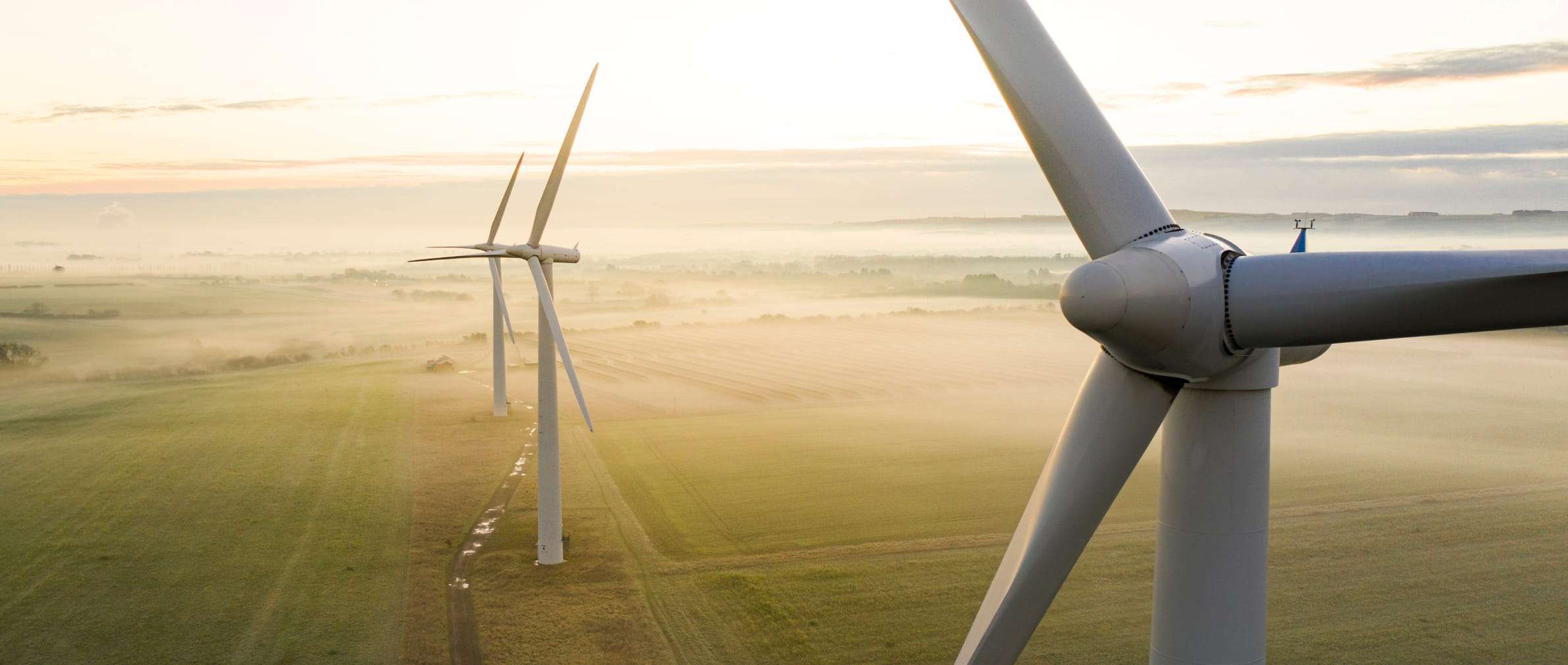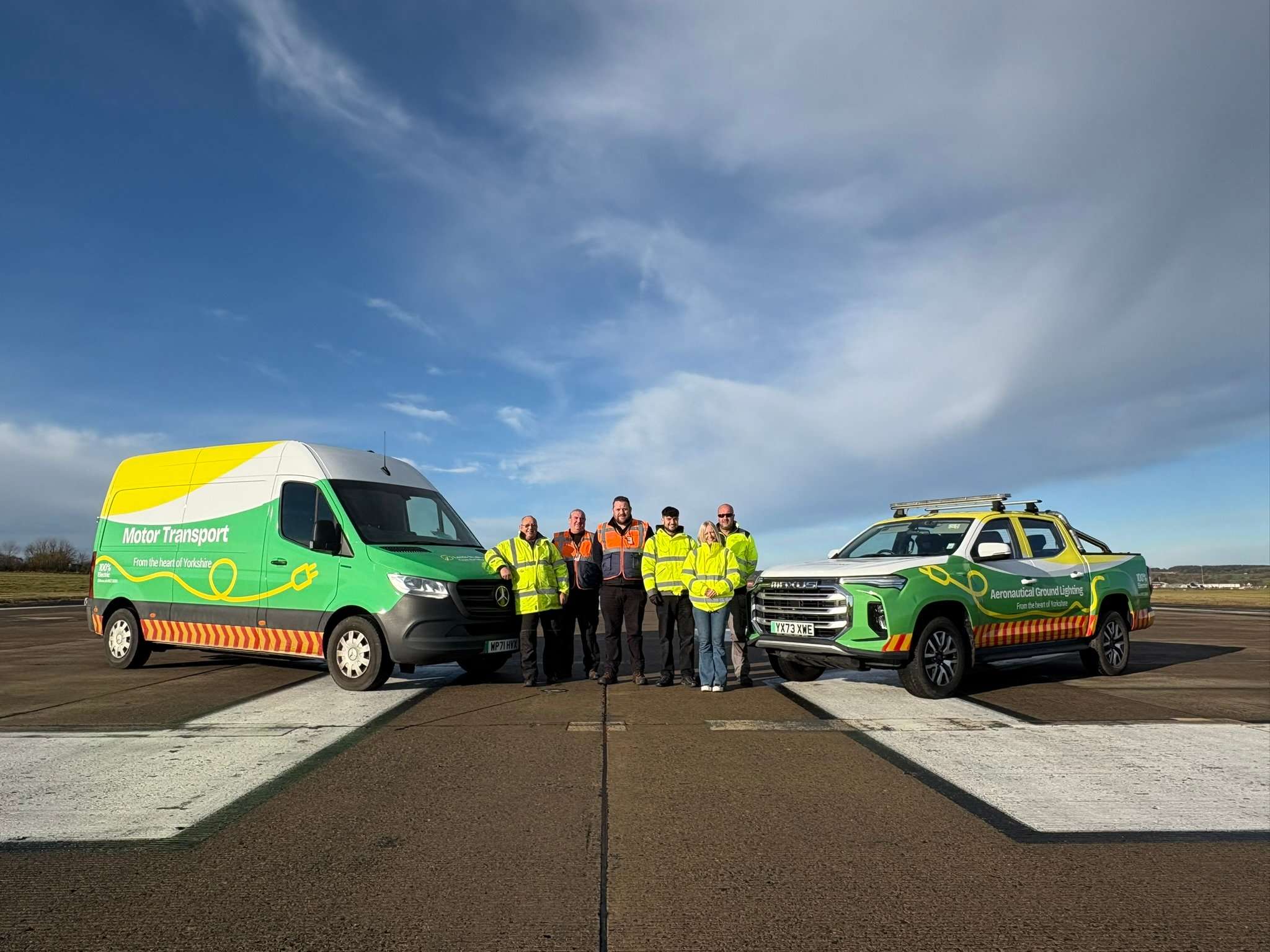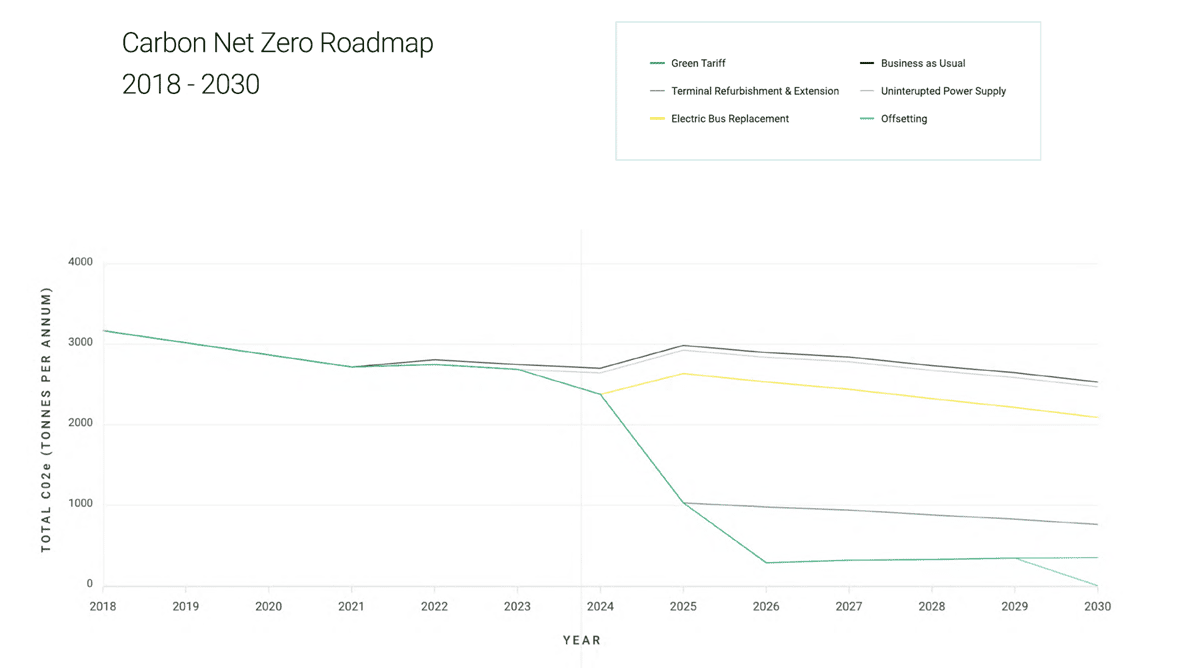
Our roadmap to Net Zero
Our roadmap to Net Zero by 2030
LBA are committed to becoming a net zero carbon airport by 2030. To date, we have carried out various projects to reduce our carbon footprint, in both the terminal and external areas. This work is continuing as we proactively implement our carbon strategy.
Foreword from Vincent Hodder our CEO
All businesses, but particularly aviation businesses, have an obligation to their community to limit the environmental footprint of their operations. Leeds Bradford Airport’s “Net Zero Carbon Roadmap” is our commitment to long term, sustainable airport operations. There is no longer a question over whether the decisions we take have an impact on the climate of our planet. The increasing incidence of extreme weather events, the rapid warming of the planet and the melting of polar ice caps are a direct signpost of the severity of the challenges we all face in the future.
As an airport we are committing to eliminate, before the 31st December 2030, all carbon emissions under the direct control of the airport. , That is those emissions classified as Scope 1 or Scope 2 emissions, with the offsetting of any residual emissions as a last resort. Our "Net Zero Roadmap" is a detailed, robust and deliverable plan for how we are going to achieve that commitment. We accept that the vast majority of emissions related to the operations of the airport are those related to flights into and out of the airport and those related to ground transportation to and from the airport, which we as the airport operator do not control. We are committed to working with our airline partners and our customers to support them in reducing their environmental impact and ensuring that we provide the infrastructure, services and incentives they need to successfully implement their own sustainable aviation pathways.
We are proud of the efforts of our leading airlines; Jet2, Ryanair and KLM, who are all making large investments in sustainability and supporting the development of technologies and business processes, to reach a net zero outcome by 2050. We acknowledge the leadership shown by Leeds City Council and Bradford Council in declaring a climate emergency and Leeds City Council, in particular, for their commitment to being carbon neutral by 2030 as a catalyst for Leeds Bradford Airport’s "Net Zero Roadmap".
Our progress to date
48% Reduction in CO2 emissions in the last 6 years
We have achieved this by:
Installing LED lighting throughout the terminal, with motion sensors fitted in many areas, including offices, to reduce energy usage; Retrofitting variable speed drives on the escalators in the terminal to reduce power usage during periods of low utilisation; and upgrading the airfield signage light boxes from the existing fluorescent strip lighting to LEDs.
100% LED lighting on our runway
This major project, which took three years, was completed in 2019. Whilst our passengers numbers have increased, at the same time this project has enabled a significant reduction in carbon emissions, decoupling airport growth from increased carbon emissions.
100% of our electricity supply is from renewable sources.

We’re accredited under the Airport Carbon Accreditation Scheme (ACAS), a voluntary global management standard specifically for airports.
There are six levels to ACAS and we are aiming to achieve the highest level possible. We achieved Level 1 in 2020 and in early 2022, we achieved Level 2, demonstrating a year on year reduction in our carbon footprint.
The highest level of accreditation requires us to align our carbon management ambition with global climate goals and transform our operations with absolute emissions reductions. This includes both the emissions we control, such as our energy use and those we can influence, for example third party ground operations and flights.
We partnered with the University of Warwick, to research the future of zero-emission airport operations. This pioneering programme of research saw the creation of a model for airport energy, simulating and understanding the infrastructure impacts of electric and hydrogen aircraft, as well as support vehicles, on UK airport operations.
This research is part of a wider Zero Emissions Flight Infrastructure project, which will identify the opportunities and challenges associated with adopting zero emission aircraft within UK aviation. The funding for the project was awarded by the Department for Transport’s Transport Research and Innovation Grant programme – TRIG: Zero Emission Flight, which was delivered by Connected Places Catapult.
Owned and controlled emissions
We’re undergoing a major terminal extension and refurbishment that presents significant opportunity to decarbonise LBA. Emissions we own and control are known as Scope 1 and Scope 2 emissions. This includes all the carbon emissions for which we are directly responsible and in full control of. For example, our own energy use, heating, cooling and company vehicles.
It is for this reason, that our carbon roadmap focusses on our own emissions as a priority, since we are in full control of this. However, we can’t ignore the emissions produced by our on-site business partners (Scope 3 emissions), including the airlines. Therefore, we are committed to putting measures in place to encourage and make it easier for our partners to decarbonise their own operations.

2023 - Greener energy supply and management
All electricity supply to the airport will be guaranteed to originate from renewable sources and we will also instigate the on-site generation of renewable energy.
2025 - Biofuels
We are switching from diesel to biofuel, which will provide at a least a 90% reduction in carbon emissions from our vehicle fleet whilst we transition to EV.
2026 - Terminal Refurbishment, Extension & Energy Efficiency
A full refurbishment of the existing terminal building will include the removal of natural gas for heating to an alternative, sustainable heating system, along with energy efficiency improvements. This includes new efficient baggage belt equipment and reflective window film along the arrivals corridor to reduce solar heat gain, thus less cooling required during the summer months.
In addition, the terminal building will receive a fully electrified and energy efficient extension.
2029 - Offsetting emissions
Carbon offsets will be purchased from the most established and credible programmes, for example, Gold Standard certified projects, for any emissions that cannot be reduced by other means. However, we propose to keep this to an absolute minimum.
Emissions we can influence
Surface access for staff and passengers
We are proposing to redevelop a plot of land on the airport site into a dedicated EV charging hub for use by our passengers, staff and on-site partners.
We’re working with Leeds City Council and Bradford City Council to increase the range of travel options available to our customers and staff:
- Free pick-up and drop-off on the terminal front for EV drivers. In addition, an electric vehicle salary sacrifice scheme has been set up to assist and incentivise our employees in purchasing a brand-new electric vehicle.
- We have worked with our airport transport partner, Transdev, to upgrade the existing Flyer bus network to a fully hybrid fleet. In addition to an increase in passenger capacity, engineers at Mercedes Benz predict that the integration of this cleaner hybrid power solution will deliver an 8.5% reduction in fuel consumption, further reducing our total CO2 emissions. In order to encourage our employees to take the bus to work, a 50% discount is available for staff on all the Flyer buses.
- Supporting Leeds City Council and West Yorkshire Combined Authority in building LBA Parkway – a new railway station, less than a mile away that will link the airport via an electric shuttle bus, improving public transport links to the airport.
- A Cycle to Work Scheme has been available to our employees since 2010, as part of our sustainable travel plan. The government changed their guidance on cycle to work schemes in 2019, removing the £1,000 cap on the purchase bikes and equipment. This allowed us to change our policy to allow bike purchases up to the value of £3,500, which enables our employees to purchase electric bikes, thus making the scheme more relevant and accessible as ever.

Third party ground operators
We’ve introduced eight fixed electrical ground power (FEGP) in order to phase out the diesel-powered mobile ground power units (GPUs), which are used to provide the aircraft with power whilst on the ground and when their engines are switched off. FEGPs allows the aircraft to obtain power directly from the local grid. In addition to providing carbon savings, this will also improve the local air quality.
In order to encourage our on-site business partners to switch to sustainable ground fleets, we will be providing EV charging infrastructure throughout the airport site.

Aircraft
LBA’s flight emissions will significantly reduce as aircraft decarbonise in the long term. We’re assisting this by:
- Offering financial incentives for new aircraft operations through favourable landing fees.
- Supporting airlines with their own sustainability plans.
- Jet2 launched their ‘Jet2 net zero’ strategy in September 2021, which sets out their decarbonisation plans to be net zero by 2050. The plan can be downloaded here: https://www.jet2plc.com/en/the-environment
- Ryanair already operate one of the youngest fleets of aircraft in the skies and has offered its passengers a voluntary carbon offset scheme since 2018. Ryanair have committed to help the aviation industry deliver a 50% reduction in CO2 emissions over 2005 levels, by 2050. Ryanair’s environmental commitments can be downloaded here: https://corporate.ryanair.com/sustainability/
- KLM launched their ‘Fly Responsibly’ campaign in 2019 to encourage travellers and the aviation industry to consider the environmental impact of flying. In January 2021, KLM were also the first airline in the world to carry out a commercial passenger flight using Sustainable Aviation Fuel (SAF). Further details on how KLM are taking a leading role in the future sustainability of aviation can be found here: https://www.klm.nl/en/information/sustainability
- Participating in Research & Development case studies to ensure we are prepared for the introduction of zero emission aircraft.
